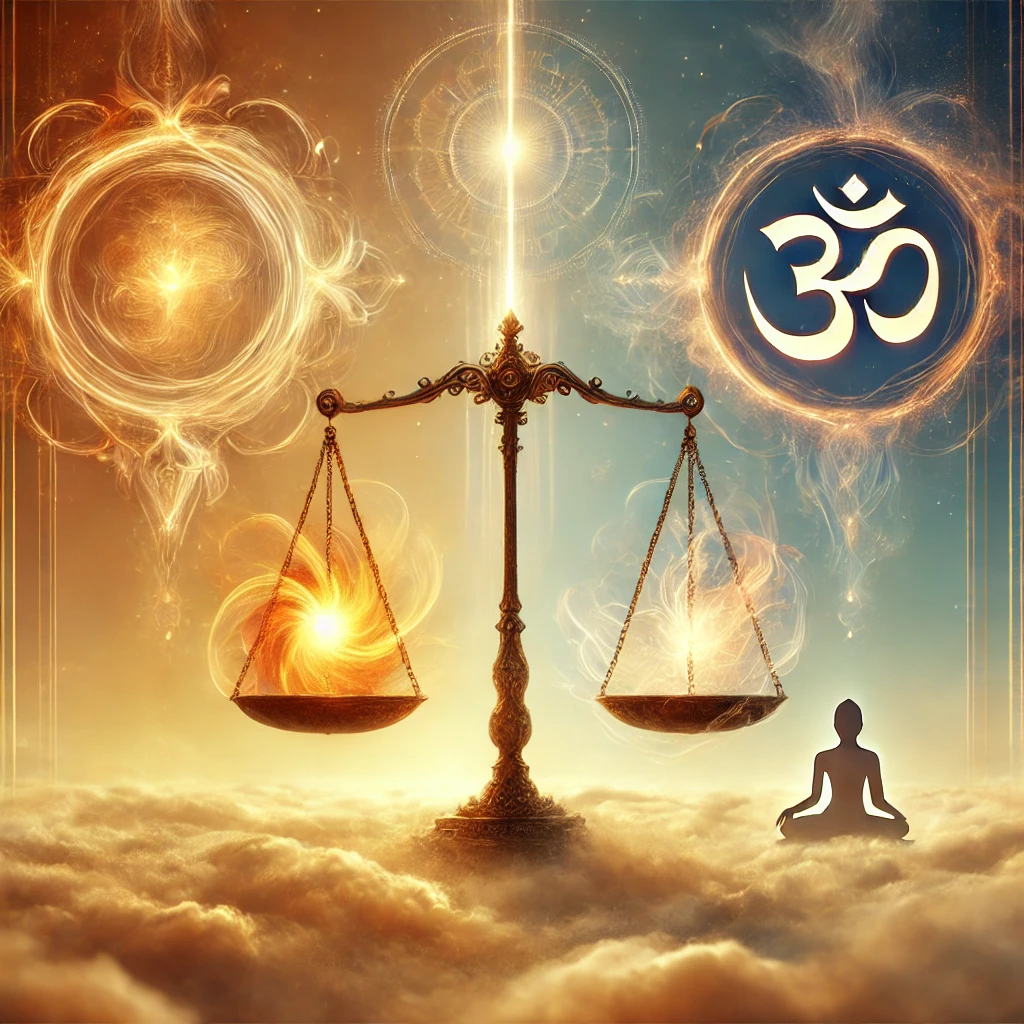Karma stands as one of the most profound principles guiding the cycle of life. At its core, karma represents the universal law of cause and effect — the idea that every action we take, every word we speak, and every thought we entertain, inevitably returns to us, shaping the fabric of our lives. Whether it’s through good deeds or harmful actions, karma is a force that governs our experiences and relationships, both in this life and beyond.
The Essence of Karma in Hinduism and Buddhism
Karma – A Universal Principle
The word karma, derived from the Sanskrit term “karman,” means “action” or “deed.” It’s a central concept in the spiritual traditions of Hinduism and Buddhism, but its significance transcends religious boundaries. Karma emphasizes the connection between our actions and their outcomes. In simple terms, what we sow, we eventually reap. Good intentions and positive deeds result in favorable outcomes, while harmful actions lead to suffering.
Karma in Hinduism
In Hinduism, karma plays a crucial role in the broader understanding of Samsara, the cycle of death and rebirth. Hindus believe that every soul (atman) is bound by karma, influencing the course of their reincarnations. One’s actions, whether in thought, word, or deed, determine the conditions of their next life. The ultimate goal for Hindus is to escape this karmic cycle by attaining Moksha, or liberation. Only when one has purified their karma can they be freed from the endless cycle of birth and rebirth.
Key Teachings in Hinduism:
- Prarabdha Karma – This is the portion of past karma that is ripe and is bearing fruit in the current life.
- Sanchita Karma – The accumulated karmic impressions from all previous lives.
- Agami Karma – The new karma that we generate in the present, which will bear fruit in future lives.
Through practices like meditation, ethical living, and selfless service (Seva), Hindus believe they can transform negative karma into positive spiritual energy, gradually leading to liberation.
Karma in Buddhism
In Buddhism, karma is similarly important but is interpreted slightly differently. The Buddha taught that karma isn’t simply a balance of good and bad deeds, but rather the intentionality behind our actions. Karma is seen as a mental action, rather than just a physical or verbal one, focusing more on the moral intent behind each action. Buddhists believe that everything we experience in this life — whether pleasant or painful — is the result of our previous thoughts, words, and deeds. To break free from this karmic cycle, Buddhists strive for Nirvana, the state of enlightenment where one is no longer subject to suffering or rebirth.
Key Concepts in Buddhism:
- Karma is cumulative – Every action, whether small or large, adds up over time.
- Intention matters – The motivation behind an action is as important as the action itself.
- Compassion and wisdom – By cultivating compassion and wisdom, one can reduce the creation of negative karma.
Real-Life Examples of Karma
The concept of karma is often illustrated through simple stories or parables, but it’s something we witness in everyday life. Consider the individual who consistently acts out of kindness and compassion. Over time, they may find that their relationships flourish, and they attract positivity into their lives. On the other hand, someone who harms others may eventually find themselves facing difficult circumstances, isolated, or suffering from the consequences of their actions. This idea resonates with the popular saying, “What goes around, comes around.”
Karma and Social Behavior
Karma also serves as a reminder of our interconnectedness. Every action we take impacts the world around us, whether directly or indirectly. In today’s world, we can see this in how communities and societies function. Acts of generosity often inspire others to pay it forward, while harmful behaviors can create cycles of negativity and conflict.
For instance, a company that engages in environmentally destructive practices might generate profit in the short term, but eventually, the ecological damage caused could lead to financial loss, regulatory challenges, and societal backlash — an example of karma playing out in modern contexts.
Misconceptions About Karma
Karma is Not Punishment or Reward
One of the most common misunderstandings is that karma functions like a cosmic system of reward and punishment. In reality, karma is neutral; it’s neither inherently good nor bad. It simply reflects the natural outcome of one’s actions. A good action doesn’t guarantee instant rewards, and bad actions might not lead to immediate suffering, but over time, the cumulative effects of karma will manifest in our lives.
Karma is Not Fixed
Another misconception is that karma is permanent and unchangeable. However, both Hinduism and Buddhism teach that we can alter the course of our karma through mindful and intentional living. By cultivating virtues such as compassion, patience, and wisdom, we can purify our past karma and create a more positive future for ourselves.
How to Apply Karma in Everyday Life
Practicing Mindful Karma
So how can we consciously apply the principles of karma in our daily lives? It begins with mindfulness — paying attention to the motivations behind our thoughts, words, and actions. Are we acting out of kindness, or are we driven by selfish desires? By aligning our actions with positive intentions, we can gradually transform our karma and contribute to a more harmonious world.
Here are some simple steps:
- Act with Compassion – Small acts of kindness, like helping a neighbor or showing patience with a difficult person, generate positive karma.
- Reflect on Your Intentions – Before making a decision, ask yourself, “What is my motivation? Will this action lead to harm or benefit?”
- Practice Forgiveness – Letting go of grudges and resentment not only frees others but also releases the negative karmic energy we carry.
Expert Insights on Karma
According to His Holiness the Dalai Lama, “Karma means action. It is a concept that emphasizes the importance of intention and consequence.” The Dalai Lama stresses that every action, whether large or small, contributes to our overall karmic state. Similarly, Indian spiritual leader Sri Sri Ravi Shankar explains that karma is not about fate or destiny but rather the choices we make every day. “We have the power to change our karma through awareness,” he says, “by practicing kindness and compassion.”
Living with Karma
Ultimately, karma reminds us of our responsibility to ourselves and others. Every action has a ripple effect, influencing not only our personal lives but the world around us. By understanding the principles of karma, we can make conscious choices that lead to greater peace, joy, and fulfillment.
Whether you’re seeking to improve your spiritual journey or simply want to live a more mindful life, embracing the concept of karma is a powerful step toward personal growth.
For those looking to deepen their spiritual practice, consider exploring spiritual accessories that can support your journey. Visit spiritualguru.lk for a wide range of spiritual tools, including malas, healing crystals, and Rudraksha beads that are believed to help balance karmic energy and enhance your spiritual development.
By living in alignment with karmic principles, we can create a life filled with purpose, compassion, and ultimately, liberation.







Pingback: The Power Of Forgiveness In Releasing 3D Karma